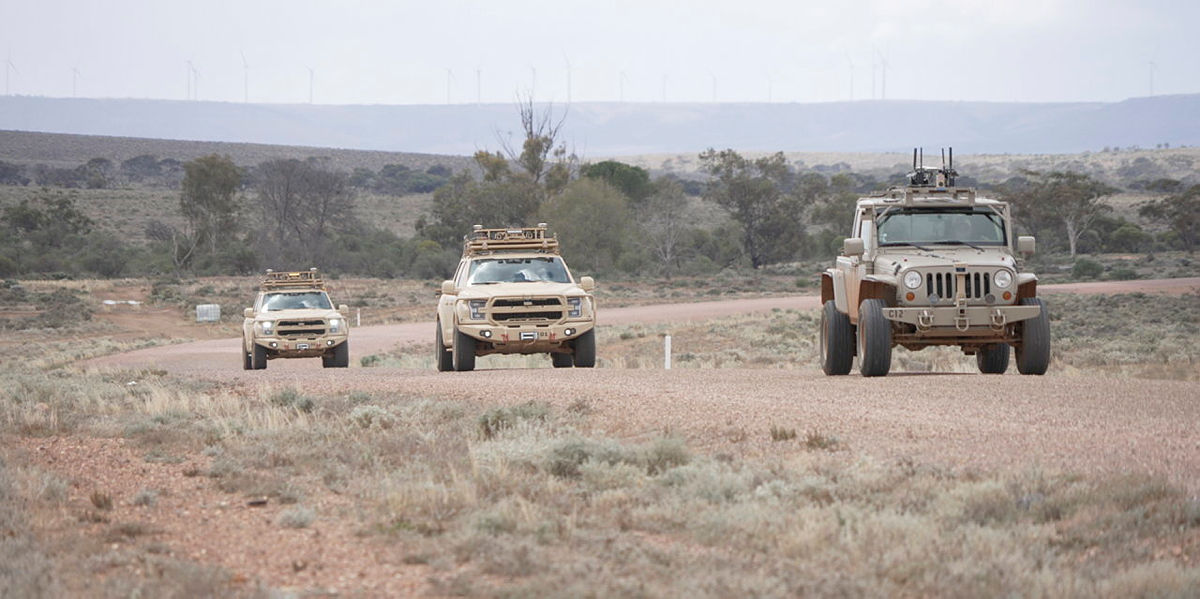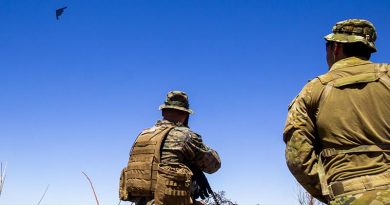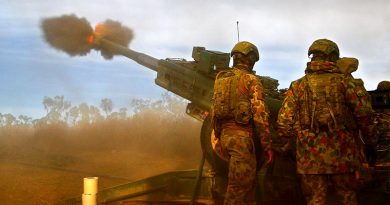AUKUS trials artificial intelligence in robotic vehicles
Share the post "AUKUS trials artificial intelligence in robotic vehicles"

Australia, the United Kingdom, and the United States have successfully demonstrated the integration of advanced autonomy and artificial intelligence (AI) to test the resilience of autonomous assets in a contested environment.
CAPTION: Australia, the United Kingdom, and the United States have successfully demonstrated the integration of advanced autonomy and artificial intelligence (AI) to test the resilience of autonomous assets in a contested environment.
Australia, the United Kingdom, and the United States have successfully demonstrated the integration of advanced autonomy and artificial intelligence (AI) to test the resilience of autonomous assets in a contested environment.
Conducted in South Australia in late 2023, the Trusted Operation of Robotic Vehicles in a Contested Environment (TORVICE) trial combined Australian, UK and US innovation and technology to test leading-edge AI in uncrewed robotic vehicles.
TORVICE tested the ability of autonomous vehicles to complete their missions and preserve network connectivity in a contested environment.
In December 2023, AUKUS Defence ministers announced that resilient and autonomous artificial intelligence technologies would be integrated into national programs in 2024.
The TORVICE trial takes us a step closer to adopting these technologies in the land domain.
The trial comprised UK and US robotic ground vehicles to represent autonomous multi-domain launchers and uncrewed ground vehicles, tasked to conduct long-range precision fires and other associated missions. The vehicles carried no weapons during the trial.
Australian scientists subjected the vehicles to attacks from electronic warfare, electro optical laser, and position, navigation and timing systems to test resilience.
Guy Powell, Principal Adviser, Land Autonomy, UK Defence Science and Technology Laboratory, said networked autonomy would be critical to future warfighting.
“Robotic and autonomous systems have the potential to transform the battlefield providing a force multiplier while reducing risk to warfighters,” he said.
“TORVICE allows us to understand robotic autonomous systems’ operation in a contested environment and increase resilience of these systems. Working across three nations will accelerate development of robust capable systems.”
Shane Canney, Chief Land and Integrated Force, Defence Science and Technology Group,saidinteroperability with AUKUS partners on land, at sea, in the air and in cyber space would support the ADF to maintain its strategic military edge.
“Understanding how robotic vehicles react in contested environments accelerates our collective know-how and helps improve the system to overcome such attacks,” Dr Canney said.
“Transitioning trusted robotic capabilities into the hands of our warfighters safely and ethically is a priority.”
Kimberly Sablon, Principal Director for Trusted Artificial Intelligence and Autonomy, US Department of Defense, said TORVICE built uponthe first AUKUS artificial intelligence and autonomy trial held in the UK.
“The TORVICE project builds upon the work the AUKUS partners demonstrated in Salisbury in April [2023],” Dr Sablon said.
CAPTION: A US Jeep leads two US Raptors during a Trusted Operation of Robotic Vehicles in a Contested Environment (TORVICE) trial.
“During this exercise, we performed rigorous red teaming of our autonomous and AI systems to assess and mitigate vulnerabilities and to improve their resilience in contested and complex environments.”
Through AUKUS, Australia, the UK, and the US are collaborating to accelerate collective understanding of AI and autonomy technologies, and how to rapidly field robust, trustworthy AI and autonomy in complex operations.
Australia, the UK and the US continue to uphold the values of safe and responsible use of AI.
Australia, the United Kingdom, and the United States have successfully demonstrated the integration of advanced autonomy and artificial intelligence (AI) to test the resilience of autonomous assets in a contested environment.
Conducted in South Australia in late 2023, the Trusted Operation of Robotic Vehicles in a Contested Environment (TORVICE) trial combined Australian, UK and US innovation and technology to test leading-edge AI in uncrewed robotic vehicles.
TORVICE tested the ability of autonomous vehicles to complete their missions and preserve network connectivity in a contested environment.
In December 2023, AUKUS Defence ministers announced that resilient and autonomous artificial intelligence technologies would be integrated into national programs in 2024.
The TORVICE trial takes us a step closer to adopting these technologies in the land domain.
The trial comprised UK and US robotic ground vehicles to represent autonomous multi-domain launchers and uncrewed ground vehicles, tasked to conduct long-range precision fires and other associated missions. The vehicles carried no weapons during the trial.
Australian scientists subjected the vehicles to attacks from electronic warfare, electro optical laser, and position, navigation and timing systems to test resilience.
Guy Powell, Principal Adviser, Land Autonomy, UK Defence Science and Technology Laboratory, said networked autonomy would be critical to future warfighting.
“Robotic and autonomous systems have the potential to transform the battlefield providing a force multiplier while reducing risk to warfighters,” he said.
“TORVICE allows us to understand robotic autonomous systems’ operation in a contested environment and increase resilience of these systems. Working across three nations will accelerate development of robust capable systems.”
Shane Canney, Chief Land and Integrated Force, Defence Science and Technology Group,saidinteroperability with AUKUS partners on land, at sea, in the air and in cyber space would support the ADF to maintain its strategic military edge.
“Understanding how robotic vehicles react in contested environments accelerates our collective know-how and helps improve the system to overcome such attacks,” Dr Canney said.
“Transitioning trusted robotic capabilities into the hands of our warfighters safely and ethically is a priority.”
Kimberly Sablon, Principal Director for Trusted Artificial Intelligence and Autonomy, US Department of Defense, said TORVICE built uponthe first AUKUS artificial intelligence and autonomy trial held in the UK.
“The TORVICE project builds upon the work the AUKUS partners demonstrated in Salisbury in April [2023],” Dr Sablon said.
“During this exercise, we performed rigorous red teaming of our autonomous and AI systems to assess and mitigate vulnerabilities and to improve their resilience in contested and complex environments.”
Through AUKUS, Australia, the UK, and the US are collaborating to accelerate collective understanding of AI and autonomy technologies, and how to rapidly field robust, trustworthy AI and autonomy in complex operations.
Australia, the UK and the US continue to uphold the values of safe and responsible use of AI.
Australia, the United Kingdom, and the United States have successfully demonstrated the integration of advanced autonomy and artificial intelligence (AI) to test the resilience of autonomous assets in a contested environment.
Conducted in South Australia in late 2023, the Trusted Operation of Robotic Vehicles in a Contested Environment (TORVICE) trial combined Australian, UK and US innovation and technology to test leading-edge AI in uncrewed robotic vehicles.
TORVICE tested the ability of autonomous vehicles to complete their missions and preserve network connectivity in a contested environment.
The TORVICE trial takes us a step closer to adopting these technologies in the land domain.
The trial comprised UK and US robotic ground vehicles to represent autonomous multi-domain launchers and uncrewed ground vehicles, tasked to conduct long-range precision fires and other associated missions. The vehicles carried no weapons during the trial.
Australian scientists subjected the vehicles to attacks from electronic warfare, electro optical laser, and position, navigation and timing systems to test resilience.
Guy Powell, Principal Adviser, Land Autonomy, UK Defence Science and Technology Laboratory, said networked autonomy would be critical to future warfighting.
“Robotic and autonomous systems have the potential to transform the battlefield providing a force multiplier while reducing risk to warfighters,” he said.
“TORVICE allows us to understand robotic autonomous systems’ operation in a contested environment and increase resilience of these systems. Working across three nations will accelerate development of robust capable systems.”
Shane Canney, Chief Land and Integrated Force, Defence Science and Technology Group,saidinteroperability with AUKUS partners on land, at sea, in the air and in cyber space would support the ADF to maintain its strategic military edge.
“Understanding how robotic vehicles react in contested environments accelerates our collective know-how and helps improve the system to overcome such attacks,” Dr Canney said.
“Transitioning trusted robotic capabilities into the hands of our warfighters safely and ethically is a priority.”
Kimberly Sablon, Principal Director for Trusted Artificial Intelligence and Autonomy, US Department of Defense, said TORVICE built uponthe first AUKUS artificial intelligence and autonomy trial held in the UK.
“The TORVICE project builds upon the work the AUKUS partners demonstrated in Salisbury in April [2023],” Dr Sablon said.
“During this exercise, we performed rigorous red teaming of our autonomous and AI systems to assess and mitigate vulnerabilities and to improve their resilience in contested and complex environments.”
Through AUKUS, Australia, the UK, and the US are collaborating to accelerate collective understanding of AI and autonomy technologies, and how to rapidly field robust, trustworthy AI and autonomy in complex operations.
Australia, the UK and the US continue to uphold the values of safe and responsible use of AI.
Conducted in South Australia in late 2023, the Trusted Operation of Robotic Vehicles in a Contested Environment (TORVICE) trial combined Australian, UK and US innovation and technology to test leading-edge AI in uncrewed robotic vehicles.
TORVICE tested the ability of autonomous vehicles to complete their missions and preserve network connectivity in a contested environment.
In December 2023, AUKUS Defence ministers announced that resilient and autonomous artificial intelligence technologies would be integrated into national programs in 2024.
The TORVICE trial takes us a step closer to adopting these technologies in the land domain.
The trial comprised UK and US robotic ground vehicles to represent autonomous multi-domain launchers and uncrewed ground vehicles, tasked to conduct long-range precision fires and other associated missions. The vehicles carried no weapons during the trial.
Australian scientists subjected the vehicles to attacks from electronic warfare, electro optical laser, and position, navigation and timing systems to test resilience.
Guy Powell, Principal Adviser, Land Autonomy, UK Defence Science and Technology Laboratory, said networked autonomy would be critical to future warfighting.
“Robotic and autonomous systems have the potential to transform the battlefield providing a force multiplier while reducing risk to warfighters,” he said.
“TORVICE allows us to understand robotic autonomous systems’ operation in a contested environment and increase resilience of these systems. Working across three nations will accelerate development of robust capable systems.”
Shane Canney, Chief Land and Integrated Force, Defence Science and Technology Group,saidinteroperability with AUKUS partners on land, at sea, in the air and in cyber space would support the ADF to maintain its strategic military edge.
“Understanding how robotic vehicles react in contested environments accelerates our collective know-how and helps improve the system to overcome such attacks,” Dr Canney said.
“Transitioning trusted robotic capabilities into the hands of our warfighters safely and ethically is a priority.”
Kimberly Sablon, Principal Director for Trusted Artificial Intelligence and Autonomy, US Department of Defense, said TORVICE built uponthe first AUKUS artificial intelligence and autonomy trial held in the UK.
“The TORVICE project builds upon the work the AUKUS partners demonstrated in Salisbury in April [2023],” Dr Sablon said.
“During this exercise, we performed rigorous red teaming of our autonomous and AI systems to assess and mitigate vulnerabilities and to improve their resilience in contested and complex environments.”
Through AUKUS, Australia, the UK, and the US are collaborating to accelerate collective understanding of AI and autonomy technologies, and how to rapidly field robust, trustworthy AI and autonomy in complex operations.
Australia, the UK and the US continue to uphold the values of safe and responsible use of AI.
.
.

.
.
Share the post "AUKUS trials artificial intelligence in robotic vehicles"

![Australia, the United Kingdom, and the United States have successfully demonstrated the integration of advanced autonomy and artificial intelligence (AI) to test the resilience of autonomous assets in a contested environment. Conducted in South Australia in late 2023, the Trusted Operation of Robotic Vehicles in a Contested Environment (TORVICE) trial combined Australian, UK and US innovation and technology to test leading-edge AI in uncrewed robotic vehicles. TORVICE tested the ability of autonomous vehicles to complete their missions and preserve network connectivity in a contested environment. In December 2023, AUKUS Defence ministers announced that resilient and autonomous artificial intelligence technologies would be integrated into national programs in 2024. The TORVICE trial takes us a step closer to adopting these technologies in the land domain. The trial comprised UK and US robotic ground vehicles to represent autonomous multi-domain launchers and uncrewed ground vehicles, tasked to conduct long-range precision fires and other associated missions. The vehicles carried no weapons during the trial. Australian scientists subjected the vehicles to attacks from electronic warfare, electro optical laser, and position, navigation and timing systems to test resilience. Guy Powell, Principal Adviser, Land Autonomy, UK Defence Science and Technology Laboratory, said networked autonomy would be critical to future warfighting. “Robotic and autonomous systems have the potential to transform the battlefield providing a force multiplier while reducing risk to warfighters,” he said. “TORVICE allows us to understand robotic autonomous systems' operation in a contested environment and increase resilience of these systems. Working across three nations will accelerate development of robust capable systems.” Shane Canney, Chief Land and Integrated Force, Defence Science and Technology Group,saidinteroperability with AUKUS partners on land, at sea, in the air and in cyber space would support the ADF to maintain its strategic military edge. “Understanding how robotic vehicles react in contested environments accelerates our collective know-how and helps improve the system to overcome such attacks,” Dr Canney said. “Transitioning trusted robotic capabilities into the hands of our warfighters safely and ethically is a priority.” Kimberly Sablon, Principal Director for Trusted Artificial Intelligence and Autonomy, US Department of Defense, said TORVICE built uponthe first AUKUS artificial intelligence and autonomy trial held in the UK. “The TORVICE project builds upon the work the AUKUS partners demonstrated in Salisbury in April [2023],” Dr Sablon said. “During this exercise, we performed rigorous red teaming of our autonomous and AI systems to assess and mitigate vulnerabilities and to improve their resilience in contested and complex environments.” Through AUKUS, Australia, the UK, and the US are collaborating to accelerate collective understanding of AI and autonomy technologies, and how to rapidly field robust, trustworthy AI and autonomy in complex operations. Australia, the UK and the US continue to uphold the values of safe and responsible use of AI.](https://www.contactairlandandsea.com/wp-content/uploads/2024/02/20240206adf8694556_02.png.iifBqeHeMRUtk71jYBMA.wgYb_wPkjw-800x445.jpg)





Don’t know if something hiccupped here or with the original press release, but the same lines of info have repeated multiple times?